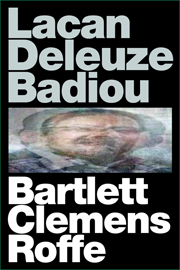2 - Contemporary
Published online by Cambridge University Press: 05 September 2014
Summary
This chapter locates our three thinkers at the heart of contemporary thought. More substantially though, it argues that it is the fact that the figure of the contemporary is also at once the milieu and a focus of their work that at least partially gives them their import. In a nutshell: for all three thinkers, to be contemporary is an injunction for contemporary thought.
Three ways of being contemporary with the contemporary
Lacan, Deleuze and Badiou take very different routes to this ‘end’. For Lacan, in order to be contemporary, it is necessary to return to the origin. This ‘return to’ is different from the ‘return of’, and indeed the former must be effected in order that the second is not. For Lacan, as a psychoanalyst, one returns to Freud, albeit not so much to the latter's key propositions, but to the new fault-lines – ‘problems’? ‘questions’? – that those propositions at once open and occlude. A return to these problems is concomitantly thought of by Lacan as the conditions of the problems of the return, and the return of those problems in a contemporary way. For Deleuze, by contrast, to be contemporary is first of all to be untimely, which is to say, to not belong to the present. The present itself is what must be resisted in order to be contemporary. This is a difficult task because of the elasticity of our habitual mode of existence which yokes us to what already exists.
- Type
- Chapter
- Information
- Lacan Deleuze Badiou , pp. 9 - 47Publisher: Edinburgh University PressPrint publication year: 2014



